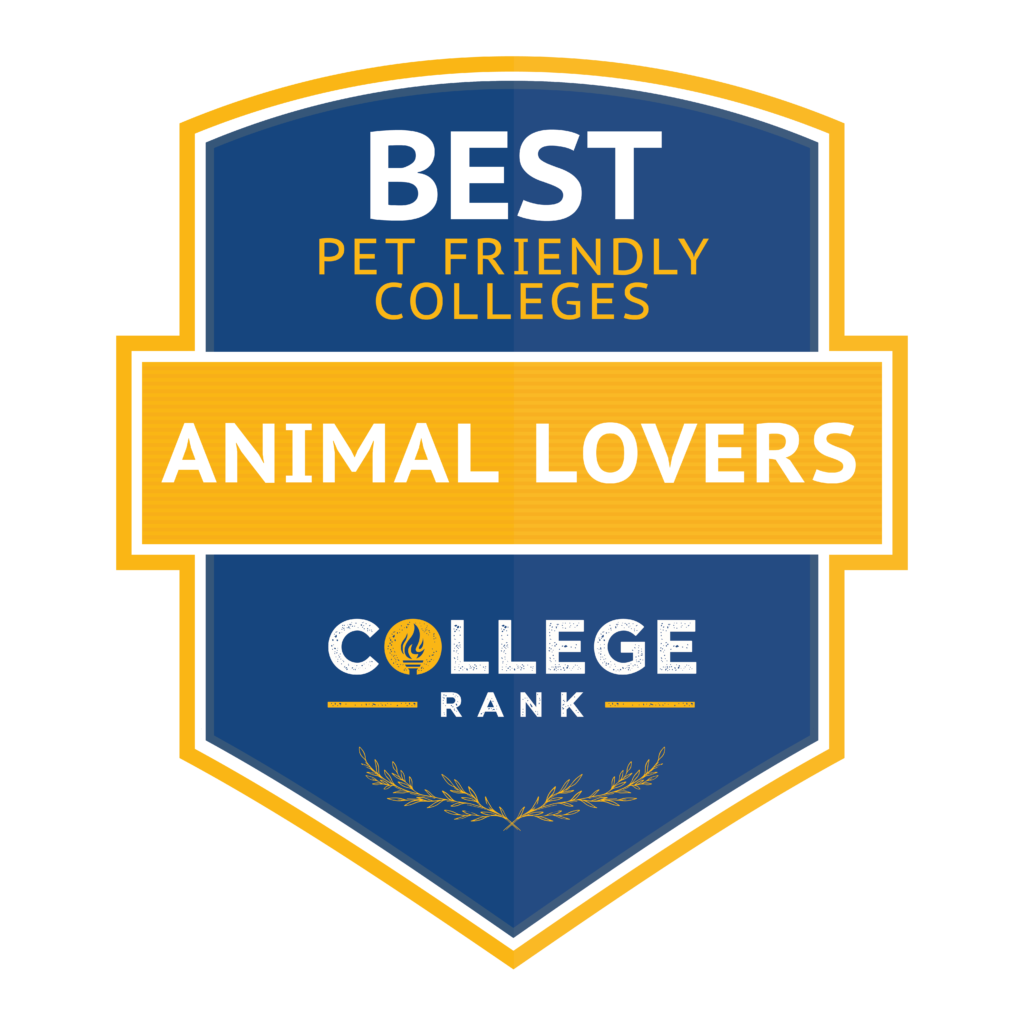
Quick Highlights:
- Our #1 ranked pet friendly college is Stephens College, followed by Sweet Briar College.
- Many colleges now allow students to bring pets, enhancing student life and providing emotional support.
- Pet-friendly policies typically include health and safety requirements such as vaccinations and spaying/neutering.
- Make sure and ask if there are any specific pet-friendly dorms!
Pets have always been a therapeutic outlet for most people. Whether we need a shoulder to cry on or unconditional love, we always embrace the furry, scaly, feathery creatures for companionship. In a college setting, pets may prove this point again by relieving student stress from being homesick, struggling during exams or tedious papers and projects, or even during a romantic break up.
Let’s face it: pets provide a sense of responsibility and a mutual respect for life, as well as another connection to a sense of community. Have you ever wondered: Do college dorms allow pets? More and more colleges and universities are accepting these truths and allowing students to have pets on campus! Some residential halls are completely pet friendly, while others have a specific pet wing.
There are good reasons behind allowing pets in dorms. Having a pet enhances the whole idea of higher education producing well-rounded citizens. All pet-friendly colleges require the following in their pet policies:
- Dogs must be of a non-aggressive breed
- All animals must be spayed or neutered
- All animals must be properly vaccinated
- All animals must be treated for fleas
All owners must complete and adhere to a pet policy agreement and pay all deposits and fees that apply. Service animals are excluded from standard restrictions in most cases.
So, you may be wondering: what colleges allow pets?
Wonder no more: check out our Top 20 Most Pet-friendly Colleges:
20. University of Washington

Among the best pet friendly college is the University of Washington, which has dedicated four apartment buildings for students in family housing who wish to be pet owners. Three of these buildings are aquatic pet-only approved. These apartment buildings allow student with pets easy access to the highly acclaimed school that is also one of the oldest on the country’s west coast.
The pet friendly campus is situated quite soundly between water and mountains with vast open spaces lined with trees. One of its pet projects is green living and sustainability. Research is the university’s primary purpose, and over $1 billion is budgeted toward that end. What a wonderful atmosphere for like-minded people to connect with each other and with other pets.
Related Resource: Best College Towns in America
19. Case Western Reserve University

Thinking beyond the possible is the school’s motto, but only small caged animals make the cut on this pet-friendly campus. Fraternity and sorority mascots are the exceptions, with pets living in the respective organizations’ houses. Rabbits and rodents are the preference here…not surprising for one of the country’s leading independent research institutions.
Case Western Reserve University is laid out on 500 acres and is surrounded by cultural, educational, medical, religious, and social services institutions. The pet friendly college’s location is right in the middle of several area museums, a vibrant downtown, and a very diversified West Side Market.
The student body represents all 50 states and 92 other countries. The Higher Learning Commission of the North Central Association of Colleges and Schools and the Association of American Universities can’t both be wrong.
18. University of Northern Colorado

The University of Northern Colorado’s pet policy is relatively new and tentatively restrictive; still, it is accepting a lot more pets than fish for the first time in 2014. Only two floors of one residential hall (Lawrenson Hall) are pet-friendly, and only one cat or dog is allowed per dorm room.
This pet friendly college focuses on connecting teaching to research. Hopefully, the newly adopted pet policy will be a successful experiment that enables the school to grow and extend more services to more pets and student pet owners. Embracing hands-on learning will also support and guide the program as it develops over time. Based on the university’s past experiences and examples, it will take the students’ input to heart when making decisions about the program in the future.
17. University of Idaho

Students at the University of Idaho have a few options to take advantage of the university’s pet policy. UI falls to the ABCs of pet ownership; only fish, small birds, and cats are allowed in apartments in residential halls. Kittens are also welcome despite the age restrictions placed on pets.
The university is regularly acknowledged by The Princeton Review as one of the best public colleges in the country, as well as one of the best 100 values in public education by Kiplinger. Students enjoy 80 acres of woodland, over 65 acres of gardens, plants, ponds, trees, and trails, and bicycle paths, and benefit from over 860 acres of farmland. With 10 miles of streets and 20 miles of sidewalks, there is plenty of room for students to walk and curb their pets.
16. Reed College

While Reed College’s guidelines aren’t too specific concerning the kinds of pets that are acceptable, they do insist that they be harmless and contained. Dogs are allowed to roam in off-leash areas, including a dog park, that are designated by the Director of Community Safety and the Director of Facilities. Spaying and neutering cats and dogs is also strongly recommended but not mandatory. Dogs must be on leashes when in common areas such as lobbies, hallways, residential halls, and paths through facilities.
Reed College’s administration also makes local wildlife a campus priority. Abusing, hunting, poisoning, or any intentional harm done to local wildlife will not be tolerated.
15. Principia College

Principia College students enjoy a relatively wide spectrum of pet options at this pet friendly campus. Aquatic pets, caged animals (including birds, rabbits and other rodents), cats, and dogs are all welcome here.
Any pet that may be freed from containment must wear an identifying tag. Animals may be walked as long as they are curbed, and no animals are allowed on the athletic fields or in the athletic buildings. Pets living off campus are welcome on campus but are bound by campus pet policies while they are here.
The campus proper is all about green spaces and extends to over 2,600 acres beyond. Pets may not be welcome, but students should take advantage of all that the Coach Crafton Athletic Center has to offer, from an 8-lane 40-meter swimming pool with diving well to indoor and outdoor fields and courts for all kinds of competitive sports. College students can enjoy the small town atmosphere on campus or cross the river into a major metropolitan environment.
14. Massachusetts Institute of Technology

M is for Meow in MIT, and kitties are the only animals allowed here. Like its think tank twin on the west coast, Cal Tech, MIT accepts cats in particular dormitories and other designated areas. Sometimes you will find pet friendly colleges that only allow one type of pet, and if you’re a cat owner, then MIT is worth checking out. Only one cat is allowed per student and must have written consent from the roommate, suitemates, and floor mates.
Resident cat owners also need the approval of the student government body that presides over all undergraduate residence dorms. All cat-friendly dorms have a Pet Chair listed with the Housing Office. MIT is world-renowned for its academic endeavors, a community connection that emphasizes work and life experiences, and a prestigious annual lecture series.
13. Middlebury College

Middlebury College sanctions fish and small rodents to inhabit the dorms, but only if they are adequately housed in tanks or cages. Snakes and ferrets are notably banned, even in cages. Guinea pigs, hamsters, or tropical fish would work nicely here. Although companion animals are allowed in designated areas on campus, none of them may be accommodated overnight. Small caged animals and fish are the extent of Middlebury’s pet policy.
Diversity is imperative on Middlebury College’s campus. It applies to the cultural backgrounds of students and faculty as well as major disciplines of study. Middlebury is one of the oldest liberal arts colleges in the country and incorporates these disciplines in all majors. The university’s reach is not bound by state or national borders. It has multiple satellite affiliations across the country and around the world.
12. Lees-McRae College

Lees-McRae College is very liberal and accommodating when it comes to pets on campus, earning it the title of one of the top pet friendly colleges in the country. Fewer restrictions allow pets to congregate outside the dorm and even in the classrooms. Here both faculty and staff are permitted to have pets as well, while other universities and colleges restrict this.
Certain residence halls are specifically pet-oriented and include a dog park. Do note that residents are allowed only one pet. Aquariums must be 20 gallons or less, and terrariums should be no more than 40 gallons in capacity. Dogs must be 40 lbs. or less when fully grown. While it is not mandatory that animals be spayed or neutered, breeding animals for any purpose is strictly prohibited.
Lees-McRae College embraces a broad core curriculum, experimental learning, and active leadership and service preparation. Additionally, the view from the middle of the Blue Ridge Mountains of western NC is to die for!
11. High Point University

High Point University’s pet policy allows fish, fully domestic cats, and dogs that are of a fully non-aggressive breed or breed mix on campus. Animals may not exceed 30 lbs., and aquatic tanks may not exceed 5 gallons. All registered pets are restricted to the North College Townhomes, and students are limited to one approved pet per town home.
High Point University feels responsible for the whole student, academics as well as personal growth. With an emphasis placed on a sense of community, pets are a great way to incorporate a sense of responsibility and belonging. In addition to being a top pet friendly college, High Point University also encourages hands-on learning and experiences outside of the classroom.
10. University of Illinois at Urbana Champaign

Aquatic pets, birds, cats, and dogs are welcome in designated areas on campus at the University of Illinois-Urbana Champaign. The university’s pet policy may be limited, but it is undoubtedly generous with the restrictions on what it allows. For example, the weight limit for animals is 50 pounds, while other universities draw the line at 40 lbs. Tank capacity for aquatic pets is 50 gallons here, while other universities limit it to 30 – 40 gallons.
The University of Illinois also enforces a six-month-old minimum age requirement for animals, while ten months of age seems to be the standard minimum age requirement among many other colleges and universities’ pet policies. The university sees pet ownership as a community extension that makes a significant impact on society.
9. Johnson and Wales University

Students at Johnson and Wales University can get in on the ground floor of the university’s pet program. The university implemented one during the fall semester of 2016. Students are able to house cats, rabbits, dogs, and aquatic pets in three residence halls.
Johnson and Wales prides itself on experimental education and embraces the opportunity to become a leader and innovator in pet-friendly college environments. Following previous educational examples set by the university, students can expect to not only be able to care for their pets, but also to be able to learn more about them and their needs.
Owning a pet falls right in line with the university’s policy that supports growth through hands-on learning and compelling experience. The pet program is expected to grow and change while being treated as a learning experience.
8. Eckerd College

You may have seen it—Eckerd College was recently featured on Animal Planet’s “Must Love Cats!” Four pet-friendly dorms embrace pets and their owners at Eckerd College.
Students are allowed a cage, terrarium, aquarium, or a combination of any two of the three. Any animal that can live or be transported in one of these is welcome at Eckerd, within policy guidelines, of course. For example, the size and breed of the dog matter, as well as whether or not snakes are venomous or more than six feet long. There are plenty of wide open spaces to walk animals or carry them around, and there is even a pet commencement. Pet policies apply per student and not per dorm room.
7. Duke University

Duke University welcomes animals fitting the description of any wild or domesticated, warm-blooded or cold-blooded animal that can be deemed harmless and can be restrained in public. No animal is approved for high participation events like Homecoming or school reunions. As far as actually living on campus goes, only legal species of fish are allowed, with a maximum tank capacity of 25 gallons.
Duke University has much to offer in academics, culture, and competitive sports. The school of medicine, observatory, and libraries are nationally acclaimed, and the prestige doesn’t hurt, either. Marine and Forest labs are also available for student research.
6. Delaware Valley University

Delaware Valley University has been a pet friendly college since August 2015. Students are allowed to house up to two animals of the same species in the same room. Thus far all manner of small rodents, particular snakes and amphibians, and a few cats have been allowed to stay.
The best part is that being a student pet owner is free of charge. The college reserves the right to check any pet’s environment and charge the owners for any damages incurred by their animals. Delaware Valley University is known for its “small-close knit” community as well as its “innovative use of hands-on learning.”
5. University of Florida

While you may be living in the heart of Gator country, unfortunately, UF rules prohibit your gator from hanging out in your dorm. But seriously, the university is very specific about what kinds of pets are allowed in residence dorms on campus. The following pets are permitted per the University of Florida’s pet policy:
- Chinchillas
- Fish
- Geckos
- Gerbils
- Hamsters
- Lizards (measuring 6 inches from snout to vent and excluding iguanas)
- non-poisonous frogs
- Non-poisonous salamanders
No other pets are permitted, no matter how similar they may be to the ones listed. UF students are allowed up to two of the pets listed, and cages may be no larger than 3 ft X 2 ft X 2 ft. The university also adamantly prohibits the feeding of wild animals.
4. California Institute of Technology

California Institute of Technology, AKA Cal Tech can also be known as Cat Tech, as felines are the only animals allowed on campus. A total of seven residence halls and their designated alleys welcome cats on the premises…no birds, dogs, or rodents. The only other pets authorized to be on campus are those housed in a 20 gallon or less terrarium or aquarium, which are also in accordance with the zoning ordinances of the city of Pasadena.
Student residents are allowed no more than two cats per dorm room, and with seven dormitories accepting them, that is a lot of cats. Cal Tech is known the world over as an education and research institution for engineering and science. Evidently cats are good for the mind as well as the soul. More than 124 acres are dedicated to benefiting society through the expansion of human knowledge and scholarly endeavors. The student-faculty ratio is 3:1, with approximately 300 professionals on the faculty.
3. Stetson University

Stetson University is generous not only in the selection of pets that are allowed but also concerning the guidelines for pets. Two dormitories on campus are prepared to house the following animals:
- Birds
- Cats
- Dogs
- Fish
- Gerbils
- Guinea pigs
- Hamsters
- Lizards
- Mice
- Rabbits
- Rats
While Stetson offers a generous pet policy, the university particularly appeals to dogs, so to speak. Dogs can enjoy a dog park, a doggie day care, and no weight or breed restrictions. Students can take advantage of a pet program that allows them to foster and train future service dogs.
Even faculty and staff may be accompanied to work by pets who are trained and obedient. Stetson is truly one of the most pet friendly colleges in the country! DeLand is a typical college town in which most area attractions are geared toward the school. Students can enjoy the company of their pets among natural springs, beaches, and state parks.
2. Sweet Briar College

What is good for the goose is not always good for the gander, especially on Sweet Briar’s campus. Only young women and horses are allowed to live here in residence halls and modern apartment complexes. If students want to attend and participate in the equestrian competition, that’s good, because it is the only way they will get to board a horse on campus.
About 3,250 acres are dedicated to horses and equestrian training and competition, including a riding center, 18 miles of trails in various terrain, open fields, indoor and outdoor rings, and a hunter trials course. All of this and a truly diverse liberal arts program are available on this gorgeous Virginia campus.
1. Stephens College

Stephens College, another all-women college, began incorporating its pet program more than a decade ago. Currently, they welcome cats, bunnies, birds, fish, and other animals, but canines seem to be the pet of choice. Evidence of pet support is all over the campus, from the president’s office to the bookstore.
Stephens College students have opportunities to connect with other student pet lovers by participating in community events such as the annual Halloween pet costume parade. Searcy Hall is also known as Pet Central on campus. There is even a pet fostering program connected to a local shelter that allows students to be temporary guardians until the animal finds a permanent home.
Scholarship opportunities are also available to student foster parents, up to $3,000. With more than 170 pet-friendly dorm rooms and a free doggie day care on campus, the college is determined to improve the lives of its students and of the dogs in the area.
Frequently Asked Questions
Most colleges don’t allow students to take their pet with them when they go away to school. But times are changing! There are pet-friendly colleges that let you take your hamster, fish, or small caged animal with you. Other schools allow a cat or small dog. Not all dorms on these pet-friendly campuses allow animals. It’s important to reach out to your housing department and find out where Bruce or Molly are welcome.
If your college is pet-friendly, and you’re considering bringing a pet with you to school, there are things to think about.
• Pets relieve stress.
• Pets make you happy.
• Pets provide companionship.
• Pets provide a sense of purpose.
But as great as pets are, they can be expensive for students. Vet bills and pet food can add stress to a tight budget. It’s important to weigh the pros and cons before bringing your pet to college.
Pet policies vary by college. Some allow small, caged animals like fish or hamsters, while others permit cats or dogs. Many colleges restrict pets due to allergies, space constraints, or potential disruptions. Guidelines regarding pets in dorms can be found with your housing department.
Concerns about cleanliness, noise, and potential conflicts among residents contribute to no pet policies. Colleges want to prevent allergies and accommodate students with different needs. But some schools allow pets in specific dorms or on-campus apartments.
The best pet for a college student depends on factors like space, time commitment, and lifestyle. Low-maintenance pets like fish or small rodents (hamsters, gerbils) can be a great choice. Some reptiles or low-energy dog breeds also work well. Always consider your schedule, living arrangements, and ability to care for your pet responsibly.
There are many benefits of having a pet in college. These include:
• Companionship: Pets offer emotional support.
• Emotional Well-being: Pet companionship positively impacts mental health.
• Exercise: Dogs, especially, encourage physical activity.
• Relaxation: Interacting with pets can reduce stress.
• Responsibility: Caring for a pet fosters accountability.
• Routine: Establishing a pet-care routine helps time management.
• Socializing: Pets can facilitate social interactions among students.
The easiest pet for college students is the one that requires minimal care and fits well with your lifestyle. Fish, specifically low-maintenance species, are a good choice. They need basic feeding and tank maintenance, but they are suitable for small, compact spaces.
Studying with a pet can have benefits for some students. Pets, especially dogs or cats, provide companionship and emotional support, reduce stress, and promote a positive study environment. Ever studied with a kitten purring on your chest? Some pets can help regulate your nervous system and reduce that test anxiety.
The relationship between owning a pet and academic performance varies. While some students find comfort and support from pets, leading to reduced stress and improved focus, others can experience distractions. Success in school depends on many things, and the impact of pets can differ from student to student.
It depends on the pet. Choose a small, low-maintenance pet suitable for confined spaces. Communicate with roommates and neighbors, ensuring their comfort with the pet. Establish a consistent care routine, address potential noise concerns, and keep the space clean to comply with dorm regulations.
Related Articles of Interest:
